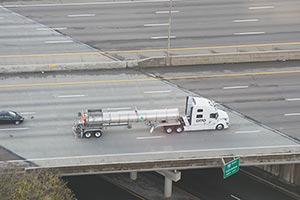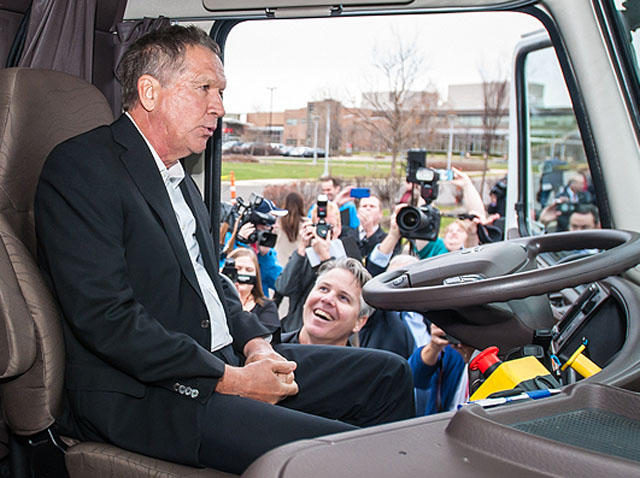Managing Editor, Features and Multimedia
Self-Driving Truck Hauls Freight in Ohio as State Unveils Investment to Aid Research

A semi-autonomous truck operated by Otto has completed the first of multiple test runs planned in Ohio this week as the state announced a $15 million investment in highway sensors and cable to support testing of advanced transportation technologies.
The Otto truck traveled in daytime traffic on public highways from Columbus to Bellefontaine on Nov. 29 to transport an empty de-icer tanker for the Ohio Department of Transportation, marking the first load delivered by self-driving truck in the state, an ODOT spokesman said.
The truck traversed Interstates 70 and 270 and U.S. Route 33 with the help of Otto’s self-driving software and sensor technology, which tracks lane markings and detects other vehicles and objects on the road. The vehicle was manned by two drivers, but completed the main portion of the trip on Route 33 primarily with the self-driving system engaged.
RELATED: Otto's beer delivery hailed as first shipment by self-driving truck
Ohio’s investment, announced by Gov. John Kasich at a Nov. 30 press event, will fund the installation of high-capacity fiber-optic cable and wireless sensors to capture research data along the state’s Smart Mobility Corridor, a 35-mile stretch of Route 33 between Dublin and East Liberty northwest of Columbus.
Kasich said the corridor will provide automotive researchers “with the perfect location and state-of-the-art infrastructure for safely testing autonomous and connected vehicle technologies.”
RELATED: Panel says platooning is near, driverless trucks far away
Otto’s self-driving truck was set to embark on another demonstration run on the Smart Mobility Corridor at the conclusion of that event and also is scheduled to travel on the Ohio Turnpike on Dec. 1.
The Ohio demonstrations followed Otto’s delivery of 51,744 cans of beer for Anheuser-Busch on Oct. 20 in Colorado, which Otto hailed as the world’s first commercial shipment by a self-driving truck.
 Ohio Gov. John Kasich in the Otto cab/Ohio DOT
Ohio Gov. John Kasich in the Otto cab/Ohio DOT Unlike the delivery in Colorado, the Otto truck was not accompanied by a police escort in Ohio.
“This delivery serves as a proof of concept of how Otto’s technologies can be deployed here in the state,” said Ognen Stojanovski, Otto’s head of policy and government relations. “We hope to continue working closely with the state into the future.”
The installation of sensors and a fiber-optic network along Route 33 is scheduled to begin in May.
“Data collected on this corridor will allow automotive innovators to test and refine jobs creating technologies that are going to help move people and products more safely and efficiently than ever before,” ODOT Director Jerry Wray said.
ODOT said the Smart Mobility Corridor also will align with work to develop the city of Columbus as a hub for intelligent transportation through a $40 million “Smart City” grant from the U.S. Department of Transportation and more than $90 million from private-sector partners.
Otto, founded in January by former Google engineers, was acquired in August by Uber Technologies Inc., which also is testing self-driving cars in Pittsburgh.

